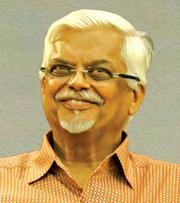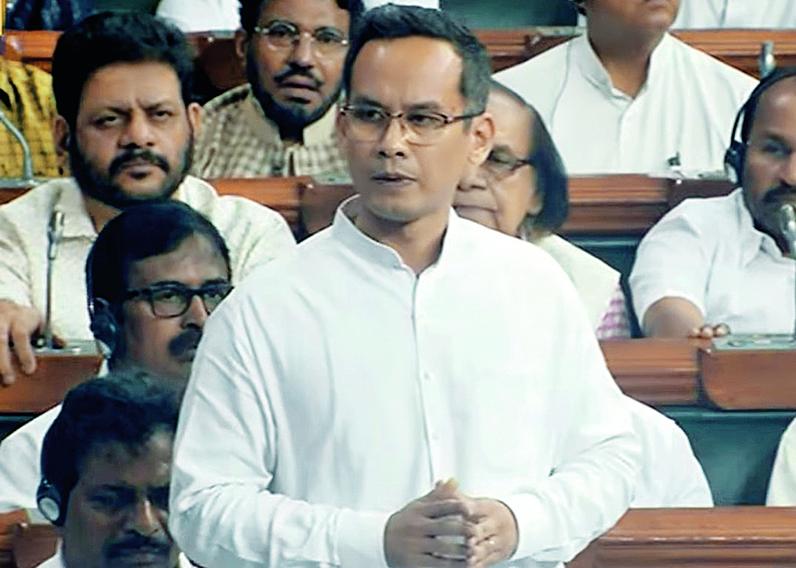
SANJAYA BARU
WE have all heard television journalists implore whoever they are seeking to interview, “Give me a byte”. In the age of electronic and digital media a byte is the equivalent of a quotable quote or a headline for print journalists. We are in the era of bytes. So who cares for that long sentence, that complex argument, that cleverly crafted paragraph. All we seek is a byte.
Time was when parliamentary debates were about substance. Today they are about bytes. That quotable quote. So, what will you take away from the two-day-long debate in Parliament on the no-confidence motion tabled by the opposition political parties, the INDIA alliance. Rahul Gandhi calling Narendra Modi a ‘Ravana’, or Gaurav Gogoi’s well-crafted critique of the Modi government’s mishandling of the situation in Manipur? My guess is we will all remember Rahul’s ‘Ravana’.
Not surprisingly, therefore, the Congress party’s strategy seems to have been that while Gogoi will state all the facts for the record, Rahul will provide the byte. The strategy worked. Even senior political journalists devoted their reportage and commentary to Rahul’s bytes while forgetting to compliment Gogoi for his well-crafted indictment of the Modi government.
Parliamentary debates of the past were for the record. Today they are for the recording, so to speak. Televised debates have made one-liners more important than long speeches. Decades from now, when a researcher reads through the archives to see what was said by whom on a particular issue, chances are they would still find Gogoi’s substantial formulations more useful. So, substance is still for the record.
Perhaps that is not being fair to the average citizen who may still wish to listen to a Parliament debate to understand what the issues are. In the early days of televised debates viewers did pay attention. Some parliamentary performances have become so famous that they are still viewed on YouTube. For example, Prime Minister Atal Bihari Vajpayee’s speech during the confidence vote of 1996.
The most important, elaborate and interesting parliamentary debates in recent memory that had many citizens glued to the television were the debate on the method of selection of Supreme Court judges, the debates on the United States-India civil nuclear energy agreement and the vote of no confidence debate of July 2008. Viewers across the country heard with great interest the views on such important issues of learned parliamentarians like Arun Jaitley, P. Chidambaram, Sitaram Yechury, Asaduddin Owaisi and so on and the stellar performances of prime ministers like Vajpayee and Manmohan Singh.
While there were always the interruptions, the shouting down of opponents and the walkouts, there were also the clever repartees and the light-hearted banter. Parliamentary debates were both educative and entertaining. The several debates in Parliament on the US-India nuclear deal, in fact, shaped the deal in a decisive way. The specific issues raised in Parliament became the talking points for negotiators. In an earlier era, Parliament debates on such policy issues as bank nationalization, trade liberalization, industrial delicensing, farm loan waivers and so on were substantial and there was much in them from which both policymakers and researchers could learn.
When was the last time one benefitted from a learned debate in Parliament on major policy changes? The infamous farm sector reforms that generated so much controversy, resulting in the government finally withdrawing the bills introduced in Parliament, in fact became controversial because they were not properly discussed and debated. An arrogant prime minister flushed with increased majority in Parliament pushed through a bill that otherwise had few flaws and needlessly allowed a controversy to brew and blow up.
When every section of society feels their views have been properly aired in Parliament it becomes easier for the government of the day to implement laws. Mere majority on the floor of the House is no guarantee that a law passed by Parliament would secure wider public approval. The citizen must feel that her views have
been taken into account in whatever the government is doing. That is the purpose of a Parliament debate.
Consider the impact that the recent debate on the vote of no confidence would have in addressing the situation in Manipur. After all, as Gogoi pointed out with such great detailing, the no-confidence motion was tabled in the context of the Central government’s handling of the situation in Manipur. Gogoi detailed his charges very well and the government was required to respond. Home Minister Amit Shah tried to do so, but not very convincingly. Even so, he at least made the effort.
However, the people of Manipur and the rest of the country were waiting eagerly to hear the prime minister speak on the subject. After all, the issue by then had become Modi’s stunning silence on the matter. He was just not uttering a word. Sections of the pusillanimous media had finally gathered enough courage to demand that the prime minister speak on the issue. A serious law and order situation in a border region is not merely an issue for the home minister to handle. The prime minister should take full responsibility and be seen to be doing so.
In the event, Modi not only took his own time, a full 100 minutes of posturing, before deigning to say something on Manipur but in fact said very little. Clearly, the people of Manipur — both sections of that society who are ranged against each other — would have felt let down. Neither would have felt reassured that their problems were at the top of the prime minister’s mind. What a pity.
Sanjaya Baru is a writer and Distinguished Fellow at the United Service Institution of India
Comments
Currently there are no Comments. Be first to write a comment!





